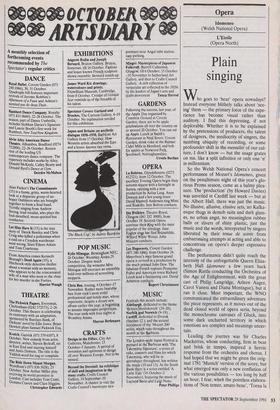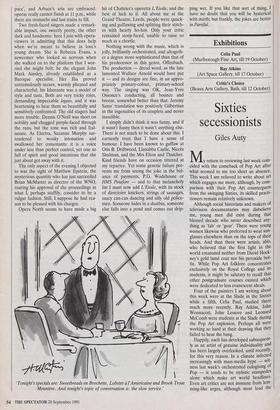Opera
Idomeneo L'Etoile (Opera North)
Plain
•
singing
ho goes to 'hear' opera nowadays? Instead everyone blithely talks about 'see- ing' them — the primary force of the expe- rience has become visual rather than auditory. I find this depressing, if not deplorable. Whether it is to be explained by the pretensions of producers, the talent of designers, the mediocrity of singers, the numbing ubiquity of recording, or some profounder shift in the mentalite of our cul- ture, I don't know — but the usage grates on me, like a split infinitive or only one 'n' in millennium.
So the Welsh National Opera's concert performance of Mozart's Idomeneo, given on the penultimate night of this year's glo- rious Proms season, came as a balmy plea- sure. The 'production' (by Howard Davies) was unveiled in Cardiff last week — but at the Albert Hall, there was just the music. No illusive, allusive, elusive sets, no Kafka- esque thugs in demob suits and dark glass- es, no urban angst, no meaningless rubber balls or slivers of shiny plastic, just the music and the words, interpreted by singers liberated by their tenue de soiree from embarrassing attempts at acting and able to concentrate on opera's deeper expressive challenge.
The performance didn't quite reach the intensity of the unforgettable Queen Eliza- beth Hall Idomeneo a few years back (Simon Rattle conducting the Orchestra of the Age of Enlightenment, with the great cast of Philip Langridge, Arleen Auger, Carol Vaness and Diana Montague), but it ran it close. Most important, the WNO communicated the extraordinary adventure the piece represents, as it moves out of the dead closed world of opera seria, beyond the monochrome canvases Of Gluck, into some dark uncharted territory in which emotions are complex and meanings uncer- tain.
Leading the journey was Sir Charles Mackerras, whose conducting, firm in beat and brisk in tempo, inspired a heroic response from the orchestra and chorus. I had hoped that we might be given the orig- inal 1781 'Munich' version of the score, but what emerged was only a new conflation of the various possibilities — too long by half an hour, I fear, when the pointless elabora- tions of 'Non temer, amato bene', 'Tom la pace', and Arbace's aria are embraced: operas really cannot finish at 11 p.m., while there are stomachs and last trains to fill.
Two fresh-faced singers made a remark- able impact, one sweetly pretty, the other dark and handsome: here I join with opera- viewers in admitting that this does help when we're meant to believe in love's young dream. She is Rebecca Evans, a newcomer who looked so nervous when she walked on to the platform that I wor- ried she might bolt; he the elegant John Mark Ainsley, already established as a Baroque specialist. Her Ilia proved untremulously secure, warmly phrased and characterful; his Idamante was a model of style and taste. Both are very tricky roles, demanding impeccable legato, and it was heartening to hear them so beautifully and sensitively confronted. The old stagers had more trouble. Dennis O'Neill was short on nobility and chugged purple-faced through the runs, but the tone was rich and Ital- ianate. As Electra, Suzanne Murphy sur- rendered to wonky intonation and swallowed her consonants: it is a voice under less than perfect control, yet one so full of spirit and good intentions that she just about got away with it.
The only aspect of the evening I objected to was the sight of Matthew Epstein, the mysterious quantity who has just succeeded Brian McMaster as director of the WNO, roaring his approval of the proceedings in what I, perhaps stuffily, consider to be a vulgar fashion. Still, I suppose he had rea- son to be pleased with his charges.
Opera North seems to have made a big hit of Chabrier's operetta L'Etoile, and the best of luck to it. All about me at the Grand Theatre, Leeds, people were quack- ing and guffawing and splitting their stitch- es with hearty ho-hos. Only your critic remained stony-faced, unable to raise so much as a chortle.
Nothing wrong with the music, which is jolly, brilliantly orchestrated, and altogeth- er a degree more sophisticated than that of his predecessor in this genre, Offenbach. The production — dread word, as the late lamented Wallace Arnold would have put it — and its designs are fine, in an appro- priately primary-colour, primary-school way. The singing was OK, Jean-Yves Ossonce's conducting, all bounce and breeze, somewhat better than that. Jeremy Sams' translation was positively Gilbertian in the ingenuities of its couplets and never inaudible.
I simply didn't think it was funny, and if it wasn't funny then it wasn't anything else. There is not much to be done about this. I earnestly trust that I have a sense of humour. I have been known to guffaw at Otis B. Driftwood, Llanabba Castle, Nicola Shulman, and the Mrs Elton and Thatcher. Kind friends have on occasion tittered at my repartee. Yet some genetic failure pre- vents me from seeing the joke in the bal- ance of payments, P.G. Wodehouse or HMS Pinafore — and to that melancholy list I must now add L'Etoile, with its stock of directoire knickers, strings of sausages, saucy can-can dancing and silly old police- men. Someone hides in a dustbin, someone else falls into a pond and comes out drip- 'Tonight's specials are: Sweetbreads en Brochette, Lobster a l'Americaine and Brook Trout Meuniere. And tonight's topic of conversation is: the slow service.' ping wet. If you like that sort of thing, I have no doubt that you will be hysterical with mirth; but frankly, the jokes are better in Parsifal.



































































 Previous page
Previous page